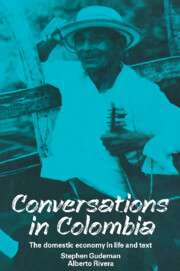1 - CONVERSATIONS
Published online by Cambridge University Press: 03 October 2009
Summary
Good conversations have no ending, and often no beginning. They have participants and listeners but belong to no one, nor to history. Inscriptions of them broaden the community of conversationalists but close the discussion to those without access to the written word. The conversations about which we write began in the mid-1980s and in 1976, and earlier than that. They took place in the Andes of Colombia and other parts of the Americas. But the full discussion – which has shifted continuously between voice and text, practice and inscription – began 2,000 years ago in Europe. Neither we and the reader nor we and the Colombian folk make up a bounded community of conversationalists, for all of us hear voices “in the air”; and many of us, including theoreticians, are inscribers of discussions “on the ground,” even when we suppose otherwise. Our text is about all these conversations, but it centers upon the voices and practices of the rural Colombians who talked about and showed us their model of a house economy.
In recent years there has been much talk about “rational” peasants and “moral” peasants, “decisive” peasants and “fetishized” peasants, “exploited” peasants and “rebellious” peasants, as if some writers were using ethnographic data to verify processes of human history and a face of human experience that they felt were already known to them. Our project is different.
- Type
- Chapter
- Information
- Conversations in ColombiaThe Domestic Economy in Life and Text, pp. 1 - 17Publisher: Cambridge University PressPrint publication year: 1990



